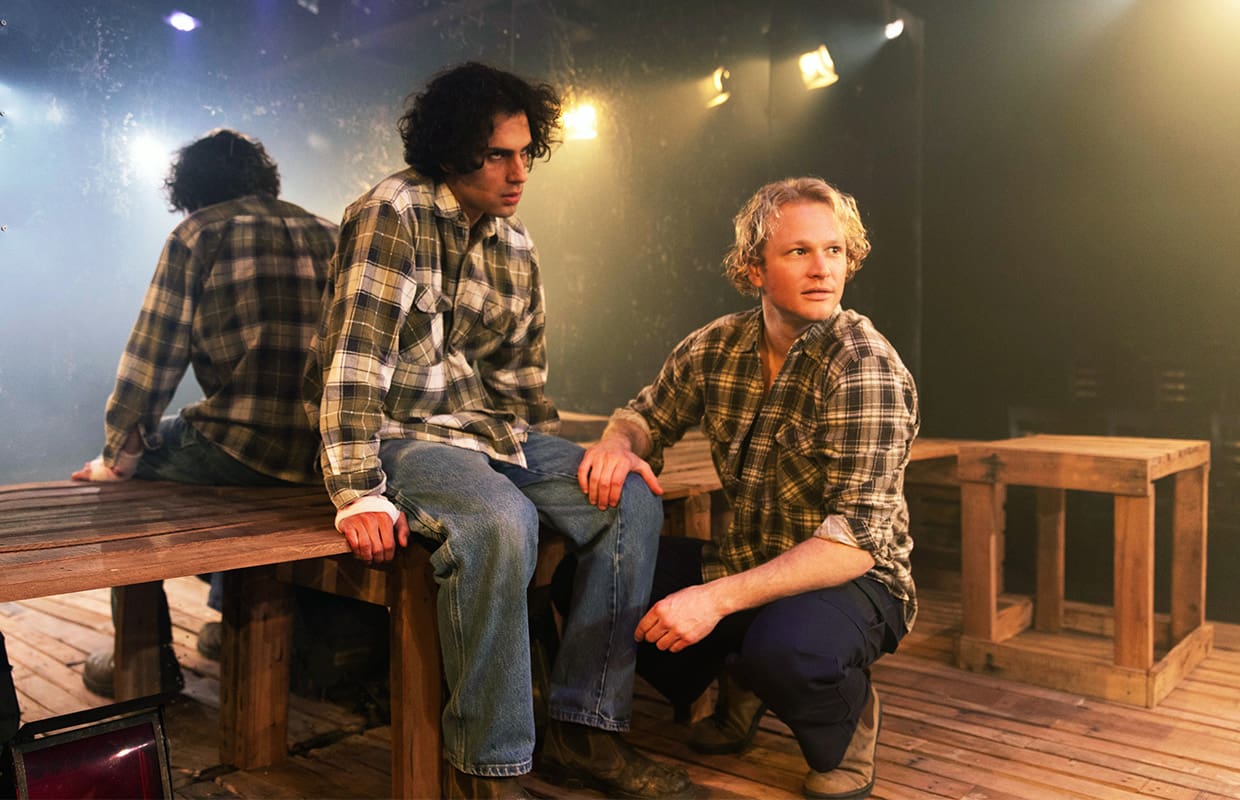Content warning: depictions of homophobia, abuse, violence.
Anyone who has dealt with the loss of a loved one knows how difficult it can be to move on. Michael Marc Bouchard’s Tom at the Farm examines a family that is unable to deal with a recent loss. Set at an isolated dairy farm in rural Ontario, the play follows Tom as he travels to the family home of his recently deceased partner, Guillame, to attend his funeral. Upon arrival, Tom discovers that his boyfriend was in fact closeted and had lied to his mother that he had a girlfriend back in the city.
Agathe, Guillame’s mother played by Di Adams, is happy to meet someone who knew her son but hurt and confused that the never-seen girlfriend is not attending the funeral. Trouble arises when Francis, Guillame’s older brother who Tom never knew existed, reveals that he knew about his brother’s secret life, and has hostile homophobic contempt for it. Through Francis’ threats of violence, Tom feels forced to reenter the closet himself and deliver a eulogy at the funeral in order to make Agathe happy. What follows is a psychosexual thriller that explores and tests the limits of what the audience conceives as the reality of violence and cycles of abuse.
Director Danny Ball and Assistant Director Sean Landis made minimal changes to the original play. In conversation with Ball about his decision to produce Tom at the Farm, he said that, as a queer person, he was interested in exploring the violence that LGBTQ+ communities have continuously been subjected to. He does so extremely effectively, as the play captures the suffocating experience of hiding one’s identity.
Actor Zoran Jetvic brilliantly conveys Tom’s internal anger as he is forced to express his pain and passion for his deceased partner in the form of a fictitious girlfriend. Francis, played by Rory O’Keefe, is similarly fascinating. While on the surface he comes off as a domineering brute, the play also explores the loneliness he experiences as the social pariah of the town and the sole caretaker of his mother.
The perverse sexual dynamic between Tom and Francis makes up the most interesting scenes of the play. They both find something in each other, Tom remarking that Francis reminds him of the dead Guillame, while Francis is able to exert control over Tom in a way that also alludes to his treatment of Guillame. Tom at the Farm is a play that is interested in the continuing cycles of abuse within families. The play regularly blurs the lines between sex and violence, and Tom begins to shows signs of Stockholm syndrome by the end of the play. He starts mimicking Francis’s words and becomes increasingly hesitant to leave the farm. You can see the audience wanting to turn away at scenes of Francis’ violence, but not quite being able to.
Sara, the co-worker Guillame pretends is his girlfriend, arrives late in the play, summoned by Tom to continue the charade for Agathe. Hannah Raven’s performance as Sara is captivating and amusing; when Francis threatens and orders her around with the hostile authority he has been imposing on Tom, she does not accept any of it. Her arrival, and her horror over Tom’s bruises and his willingness to stay on the farm, highlights the extent of the abuse he has been subjected to, and how much it has changed him.
SUDS alumni Rachael Adamson’s costumes illustratively communicate the setting and progression of the characters. The initial contrast of Tom’s expensive and tidy outfits against the farmwear of Guillame’s family highlights his status as an outsider. However, as the play progresses, Tom increasingly looks as if he fits in with Guillame’s family, demonstrating the decline of his independence.
2021 SUDS President Alice Stafford’s lighting and the Set Design of Kat Beere helps to further establish this context and dramatise the more impactful scenes in the play.
Danny Ball’s Tom at the Farm is a play that capably handles sensitive subject matter such as violence and abuse in a way that is not only realistic but deeply moving, highlighting the terrifying reality of abusive situations and the violence that LGBTQ+ communities have been forced to endure. If I had the chance, I would certainly see the show again.
Tickets to Tom at the Farm are available here, with performances continuing until September 10 at King’s Cross Theatre.





